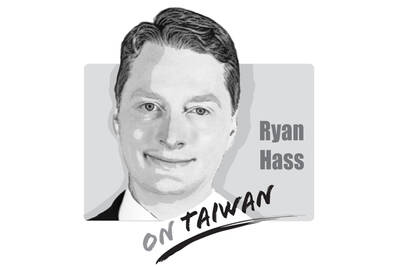With just six months left before the Olympics, the outcry from activists and observers over China's abandoned human rights promises would at last seem to be making an impression on Beijing.
Over the past week, China has released two high-profile prisoners. Yu Huafeng (
It is no coincidence that authorities would show a sudden change of heart in these two cases, reducing Yu and Ching's sentences by eight and two years respectively. China's failure to loosen the reins on the press, despite pledges to the International Olympic Committee in 2001, has received considerable attention from international media and drawn sharp criticism from governments and rights groups. The release of the two media workers at the Lunar New Year was a clear signal that the bad publicity is getting under Beijing's skin at a time when authorities are scrambling to perfect their veneer.
This is good news not only for Yu and Ching, but also for rights campaigners, as it confirms yet again that China is sensitive to how it is perceived abroad. While some countries with notorious human rights records -- such as Uzbekistan -- are unresponsive to pressure from foreign governments and organizations, Beijing is aching for worldwide admiration and recognition as a modern country and leader in the international community.
All the more reason to ratchet up the pressure.
Beijing generally responds to criticism by releasing a few well-known prisoners or announcing sweeping reforms that often do not materialize. With authorities more concerned than ever about meeting international expectations, voices abroad must make it clear that a few reduced sentences are minor improvements in the context of a nationwide crackdown on freedom of speech and increasing controls on the flow of information on the Internet. The international community must show Beijing it will not be distracted by these releases and they do not make up for broader injustices.
Last year, Reporters without Borders recorded 180 cases of foreign media workers being threatened or detained while covering sensitive subjects. In addition, over the past few months, authorities have repeatedly denied foreign journalists access to leading dissidents and their family members for interviews, despite claims that foreign journalists are now free to carry out work and research across the country without government interference. And the fact remains that the issues such dissidents represent are so strongly censored in China that most local reporters wouldn't dream of broaching them. For journalists interested in pushing the envelope, the more than 10-year prison terms given to Yu and his paper's managing editor, as well as the severity of the sentences handed down to dozens of other media workers, serve as a clear warning.
Beijing is perhaps just realizing that its broken pledges do not go unnoticed, but it has a long way to go before it fulfills them. The more than 80 Chinese cyber-dissidents and journalists in jail for their work eclipse the occasional high-profile release. Until Beijing respects the rights granted in its Constitution -- including freedom of speech and freedom of the press -- such improvements will remain token gestures in the face of its glaring insincerity.

There has been much catastrophizing in Taiwan recently about America becoming more unreliable as a bulwark against Chinese pressure. Some of this has been sparked by debates in Washington about whether the United States should defend Taiwan in event of conflict. There also were understandable anxieties about whether President Trump would sacrifice Taiwan’s interests for a trade deal when he sat down with President Xi (習近平) in late October. On top of that, Taiwan’s opposition political leaders have sought to score political points by attacking the Lai (賴清德) administration for mishandling relations with the United States. Part of this budding anxiety
The diplomatic dispute between China and Japan over Japanese Prime Minister Sanae Takaichi’s comments in the Japanese Diet continues to escalate. In a letter to UN Secretary-General Antonio Guterres, China’s UN Ambassador Fu Cong (傅聰) wrote that, “if Japan dares to attempt an armed intervention in the cross-Strait situation, it would be an act of aggression.” There was no indication that Fu was aware of the irony implicit in the complaint. Until this point, Beijing had limited its remonstrations to diplomatic summonses and weaponization of economic levers, such as banning Japanese seafood imports, discouraging Chinese from traveling to Japan or issuing
On Nov. 8, newly elected Chinese Nationalist Party (KMT) Chairwoman Cheng Li-wun (鄭麗文) and Vice Chairman Chi Lin-len (季麟連) attended a memorial for White Terror era victims, during which convicted Chinese Communist Party (CCP) spies such as Wu Shi (吳石) were also honored. Cheng’s participation in the ceremony, which she said was part of her efforts to promote cross-strait reconciliation, has trapped herself and her party into the KMT’s dark past, and risks putting the party back on its old disastrous road. Wu, a lieutenant general who was the Ministry of National Defense’s deputy chief of the general staff, was recruited
The Food and Drug Administration (FDA) on Nov. 5 recalled more than 150,000 eggs found to contain three times the legal limit of the pesticide metabolite fipronil-sulfone. Nearly half of the 1,169 affected egg cartons, which had been distributed across 10 districts, had already been sold. Using the new traceability system, officials quickly urged the public to avoid consuming eggs with the traceability code “I47045,” while the remainder were successfully recalled. Changhua County’s Wenya Farm — the source of the tainted eggs — was fined NT$120,000, and the Ministry of Agriculture instructed the county’s Animal Disease Control Center to require that